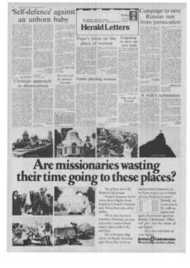Page 6, 19th October 1979
Page 6

Report an error
Noticed an error on this page?If you've noticed an error in this article please click here to report it.
Tags
Share
Related articles
Too Late The Boon
Religious Books
You May Find Your Christmas Gift Book Here
Word Perfect
Religious Books By R. C. Gorman, S.j.
Theology Today
1111S IS the kind of book which requires a great deal of study. It is a work of profound scholarship and a cursory reading of it would bear little fruit. Its purpose is not to explore the content of theology but to appraise the connection of theology with various disciplines that bear on it.
The author writes: "It is not immediately apparent how traditional theological materials are interconnected or how these are connected in turn with nontheological fields of experience and knowledge". He approaches the problem first or all from the angle of the New and Old Testaments, then goes on to the study of religion and philosophy.
This is followed by church history and then the broad field of 'the natural sciences-and humanies as well as the social sciences. The relationship between the different disciplines, he notes, creates a problem. "Each discipline is only part of the whole and requires a high degree of caution on the part of the practitioner with respect to the totality of theology in order more effectively to make a partial contribution to the whole through specialization".
He stresses the problem that arises from the difficulty of viewing theology as a whole because of the fragmentation of the various disciplines and hence the approach to them. He writes: "One should certainly not minimise the . difficulties that incontestably result from the institutional structuring of the theological concern for the truth in various disciplines in modern times." This is a book for every theological library.
THE PURPOSE of this book is to present arguments why Luke was the author of ihe Epistles to Timothy and Titus The author finds the similarity of vocabulary and style of these pastoral letters with those of Luke and Acts impressive.
He has a chapter in which he concludes that the similarities between Luke-Acts and the Pastorals in respect to eschatology are such as to encourage the notion of common authorship and the same, he finds in the following chapters, is true of the concepts of salvation and the attitude towards the Christian's civic and ethical responsibilities.
In his chapter on Christology Dr Wilson discusses the question of how accurately Luke portrays the beliefs and preaching of the early Church and he.'quotes...the consensus that the Christology of Luke-Acts is fundamentally an exhaltation Christology; the latter is also seen expressed in the Pastorals.
Finally, he writes of the relationship of Paul to the Pastorals. discussing the influence Paul is likely to have had on them.
"In those areas", he writes "where the Pastorals most clearly diverge from Paul they agree most closely with Luke-Acts. Certainly, given a choice between Paul and Luke as the author of the Pastorals, Luke is a far more likely candidate."
He ends his hook by writing: "Finally. if Luke wrote the Pastorals in addition to LukeActs, he stands as one of the most important figures in the New Testament, not only because of the sheer volume of his writings, but also because of his dominant role as in interpreter of firstcentury Christianity and a defender of the Church in its disputes with Jewish and agnostic opponents".
This is an excellent work of scholarship. It shows a wide research and deep knowledge of Scripture. "SENT", "Works", "Signs", "Testimony", "Glory", "Truth", "Life" — such are some of the themes in St John's Gospel which are treated in this book. A dominating theme is the relationship of Christ with his ,Father.
The word Father occurs 119 times in the Gospel, The author writes: "The nature of Jesus as he was sent is the key to the interpretation of the Fourth Gospel. This is shown by his works".
Ile quotes Christ's words: "There is enough to testify that the Father has sent me in the works my Father gave me to do."
The book has much to say about missionary' activity. The missionary's task is to do good. This "produces material and obvious results only sometimes ... It is rather action that continues the current °lime from the Father to Jesus and from Jesus to all who recognised him". This is a very well-thought out book by a well known Belgium theologian.
THIS IS an autobiographical account of a convicted criminal who became a Christian. "Jesus Christ had come to me in my prison cell and forgave all my evil past," writes the author.
In a former book. Breakout, he had described his early life of crime and violence which had taken him to Wandsworth and Dartmoor. This book is a description of the change in his life and its impact upon others.
Maurice Nassan SJ
blog comments powered by Disqus











